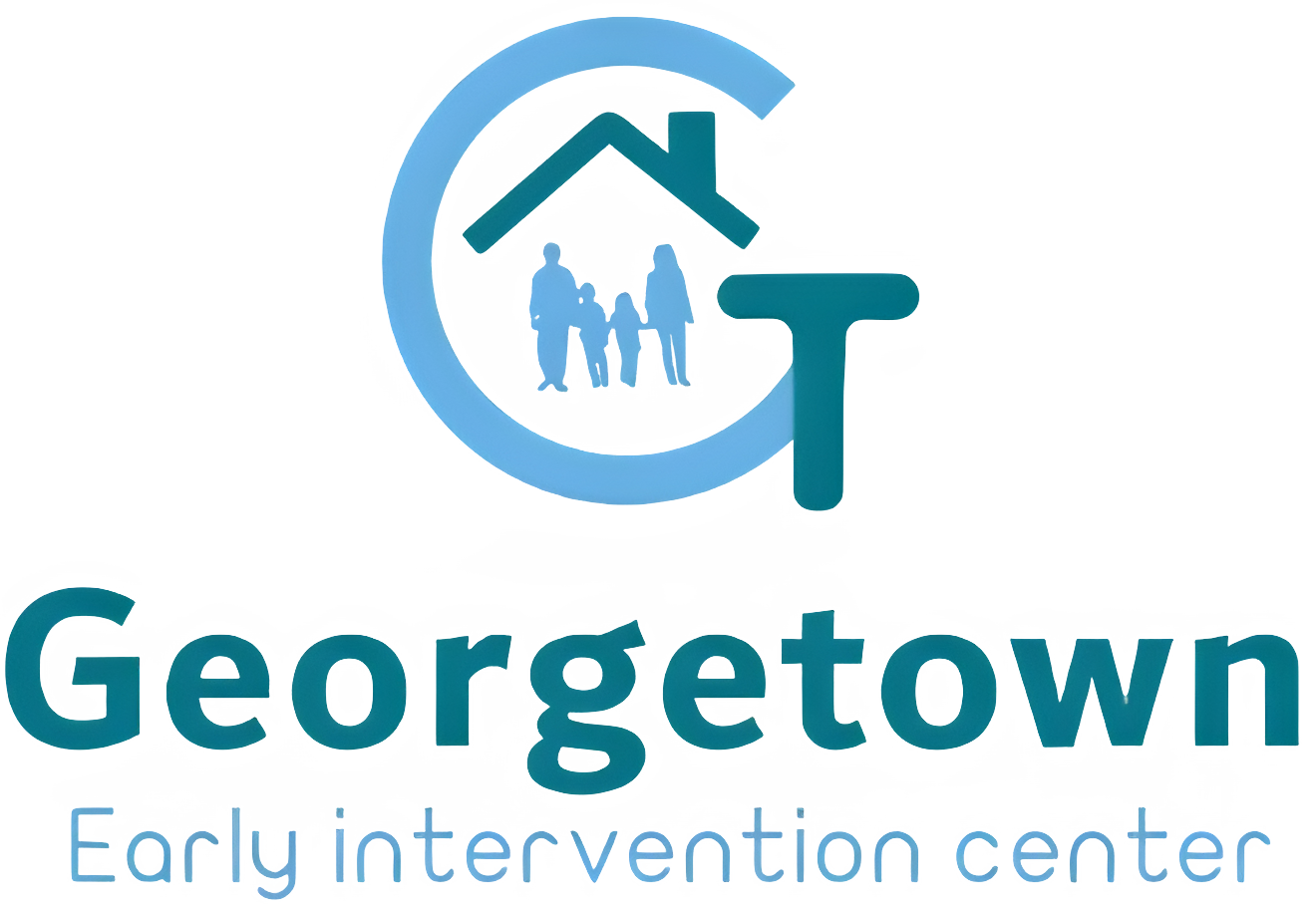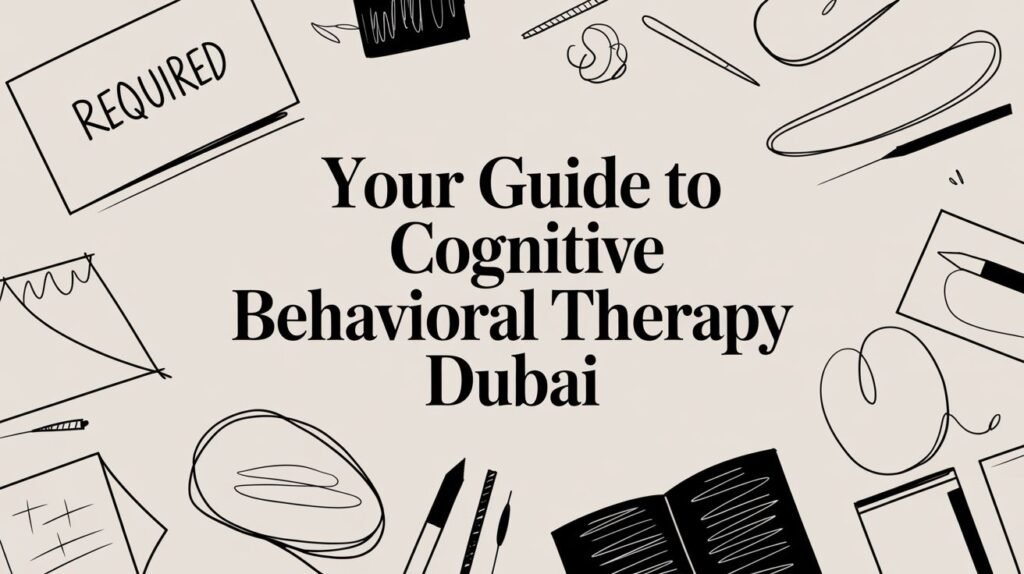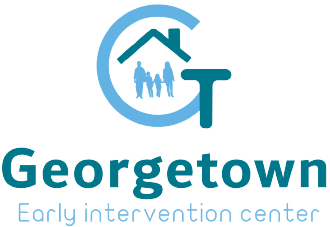Life in a city as dynamic as Dubai brings a unique mix of pressures and incredible opportunities. To navigate it all, you need a solid mental toolkit. That's where cognitive behavioral therapy in Dubai comes in—it’s not about abstract theories but about giving you practical, proven strategies to build resilience and thrive.

Your Path to Mental Wellness in Dubai
Living in such a fast-paced environment can feel overwhelming at times. Think of this guide as your roadmap to understanding Cognitive Behavioral Therapy (CBT) and how it works, especially right here in Dubai. It’s a hands-on approach that helps you recognize and reshape the thought patterns that often trigger stress, anxiety, or self-doubt.
Unlike therapies that focus heavily on your past, CBT equips you with skills to manage your thoughts and feelings in the here and now. The goal is to build lasting emotional well-being and give you a stronger sense of control over your own life.
In this guide, we'll walk through:
- The core ideas behind CBT and how you can apply them day-to-day.
- The real, tangible benefits you can expect from the process.
- What to expect in your first few sessions and how you can prepare.
- Where to find dedicated support at Georgetown Early Intervention Center.
It's best to see CBT not as a complex clinical process, but as learning a new, more helpful way to communicate with your own mind. It’s about building a set of tools you can rely on long after your sessions are over.
While CBT is a powerful strategy on its own, it’s also helpful to see how it fits into a bigger picture of mental wellness. For example, learning about the impact of occupational therapy on mental health can offer even more insight into a truly holistic approach to well-being.
How CBT Retrains Your Brain

Think of your mind as a GPS navigating you through a hectic day in Dubai. Sometimes, a small glitch can make it get stuck on a route that leads straight to stress, anxiety, or frustration. Cognitive behavioral therapy is like updating that app’s software, teaching it to find better, more efficient routes.
It all comes down to the powerful connection between your thoughts, feelings, and actions. This is often called the 'thought-feeling-behaviour' cycle. These three elements are in a constant feedback loop, influencing one another in ways that can either help you or hold you back.
Let's break it down with a real-world example, like the pressure of a major project deadline at work.
The Negative Thought Cycle
An automatic negative thought can pop into your head out of nowhere: “I’ll never get this done on time. I’m going to fail.”
This isn't just a fleeting thought; it kicks off a chain reaction. It almost immediately triggers feelings of panic and overwhelm. The behavior that follows is often avoidance—you might start scrolling on your phone or find other small tasks to do instead of tackling the project. This inaction only reinforces the original thought that you can't handle it, and the cycle digs itself in deeper.
This is exactly where a cognitive behavioral therapy specialist in Dubai can help. Your therapist works with you to catch these automatic negative thoughts and see them for what they are—just thoughts, not undeniable facts.
Shifting to a Positive Cycle
Instead of letting that initial thought run the show, you learn to challenge it and reframe it. You might replace it with something more balanced and realistic: “This project is big, but I can break it down into smaller, manageable tasks. I’ll just start with the first one.”
This simple but powerful shift can immediately change your emotional state. The panic starts to fade, replaced by a sense of focus and control. As a result, your behavior changes too. You open the document and start working on that first small step.
This practical approach gives you direct influence over your emotional responses. With practice, it becomes a skill that builds lasting mental resilience. The principles of CBT are incredibly adaptable; for a deeper look at how it's applied in specific situations, you can read about Cognitive Behavioral Therapy for ADHD and how it helps manage unique challenges.
What You Actually Gain from CBT
When you start Cognitive Behavioral Therapy (CBT), you move past just talking and into real, practical changes. Think of it as getting a mental toolkit filled with strategies you can use every day, whether you're dealing with a high-pressure meeting at work or just want to feel more at ease in social situations.
Instead of getting stuck on problems, CBT gives you actionable ways to change how you react to them. You learn to spot the emotional triggers that affect your relationships, which helps you communicate better and build stronger connections. This hands-on approach is incredibly useful, especially in a dynamic and demanding place like Dubai.
Building Resilience That Lasts
One of the best things about CBT is that it’s not a quick fix. The skills you develop are meant to stick with you long after your sessions are over, creating a solid foundation for your long-term mental well-being.
Here’s a look at what that means for you:
- Practical Coping Skills: You’ll walk away with specific techniques to handle stress, anxiety, or a low mood right when it happens.
- Better Emotional Regulation: CBT gives you the insight to understand and manage your emotional responses, so small setbacks don’t turn into major crises.
- Deeper Self-Awareness: By looking closely at your thought patterns, you get to know yourself on a whole new level—what drives you, what trips you up, and how you react.
The goal of CBT isn't to make challenges disappear. It's to build your strength and give you the skills to face them head-on. Over time, it empowers you to become your own therapist, ready to handle whatever comes your way.
A Growing Need for Effective Therapy
This focus on practical, proven results is exactly why the demand for cognitive behavioral therapy in Dubai has taken off. As people become more open about mental health, they're looking for solutions that genuinely work.
The numbers back this up. The Middle East's behavioral therapy market was valued at USD 6.72 billion in 2025, with the UAE's share alone hitting around USD 1.19 billion. It’s a clear sign that people in the region are turning to therapies like CBT. You can dig into more of the data in the full market report.
What To Expect From Your CBT Journey

Starting therapy can feel a bit like stepping into the unknown. But when it comes to cognitive behavioral therapy in Dubai, the journey is a structured and collaborative partnership. Unlike some forms of open-ended talk therapy, CBT is goal-oriented and usually has a clear timeline, so you know where you're headed right from the start.
Your very first session is about more than just talking; it's about building a team. You and your therapist will work side-by-side to map out the specific challenges you're facing and set clear, achievable goals. This collaborative approach creates a strong foundation for a focused and productive therapeutic process.
The Structure Of Your Sessions
Think of each session as an active workshop for your mind. You'll learn to pinpoint the unhelpful thought patterns and beliefs that are quietly driving your feelings and actions. It's not about assigning blame—it's about gaining awareness and, ultimately, control.
A big part of this process involves practical exercises, often called 'homework,' which are designed to help you apply your new skills in the real world. These aren't like school assignments; they're tools for real-life change.
This might include things like:
- Thought Records: A simple way to catch negative thoughts in the moment and actively challenge their validity.
- Behavioral Experiments: Gently testing your assumptions in everyday situations to see what really happens.
- Mindfulness Practices: Learning to observe your thoughts from a distance without getting swept away by them.
This hands-on approach is what makes CBT so effective. It ensures that the progress you make in the therapy room translates directly into your daily life.
To give you a clearer picture, here’s a look at the typical stages you can expect on your CBT journey:
Phases of a Typical CBT Program
| Phase | Focus | Client and Therapist Activities |
|---|---|---|
| 1. Assessment | Understanding your unique challenges and setting clear, measurable goals. | Initial interviews, questionnaires, and collaborative goal-setting. |
| 2. Psychoeducation | Learning the core principles of CBT—how thoughts, feelings, and behaviors are linked. | Therapist explains the CBT model, often using diagrams and real-life examples. |
| 3. Skill Building | Acquiring practical tools to identify and challenge unhelpful thought patterns. | Practicing techniques like thought records and cognitive restructuring in sessions. |
| 4. Application | Applying new skills and behavioral strategies to real-world situations. | Designing and carrying out behavioral experiments and exposure exercises. |
| 5. Relapse Prevention | Consolidating your progress and developing a plan to maintain it long-term. | Creating a personal wellness plan and identifying future challenges. |
As you can see, the process is designed to build on itself, empowering you step-by-step.
Your therapist is your guide, equipping you with the right tools and strategies. But you are the one who puts them to use, building new mental habits and healthier perspectives. It’s an empowering process where you become the primary agent of your own change.
The collaborative heart of CBT means that the relationship you have with your therapist is key. Finding the right professional is essential for success. You can learn more about finding the best fit for your journey by exploring the role of a clinical psychologist in effective therapy.
Finding Expert CBT Support in Dubai

Choosing the right therapist is easily the most important step you’ll take on your mental wellness journey. In a city as diverse and dynamic as Dubai, you need support from someone who understands your unique cultural background and personal situation. That's exactly what we provide at Georgetown Early Intervention Centre—a confidential and supportive space for you to grow.
Our team of highly qualified therapists specializes in adapting cognitive behavioral therapy in Dubai for adults, adolescents, and children. We know that a one-size-fits-all approach just doesn't cut it when it comes to mental health. Instead, we focus on crafting a personalized plan that truly aligns with your individual goals.
This kind of tailored care is more critical than ever. With growing mental health awareness and supportive government initiatives like the National Policy for the Promotion of Mental Health, the demand for quality therapy is on the rise. In fact, the UAE's Rehabilitation Therapy Services Market, which includes CBT, is projected to grow to USD 984.2 million by 2032.
Your First Step Towards Lasting Change
Taking that first step can feel like the hardest part, but we’re here to make it as simple and welcoming as possible. Our process starts with a straightforward consultation where we listen to your concerns and talk through how CBT can help you get where you want to be.
The goal is to create a partnership built on trust and collaboration. We are here to guide and support you, providing the tools you need to build lasting mental resilience and take control of your emotional well-being.
Our therapists are skilled in adapting CBT techniques for a wide range of challenges, ensuring your care is both effective and culturally sensitive. If you'd like to learn more about our team and what makes a great therapist, you might find our guide on choosing the best psychologist in Dubai helpful.
Beyond our sessions, many people find that digital tools are great for reinforcing new skills. If you're curious, you can explore top CBT apps for supplementary support to see what might work for you.
Your Questions About CBT, Answered
Deciding to start therapy is a big step, and it’s completely normal to have questions. When people in Dubai look into cognitive behavioral therapy, they often wonder about the timeline, the costs, and what makes it different from other types of therapy. Getting clear answers helps you feel confident that you’re making the right choice for your mental health.
We’ve pulled together some of the most common questions we hear to give you the clarity you need. Our aim is to demystify the process and show you how this practical, empowering approach really works.
How Long Does CBT Take To Work?
One of the best things about CBT is that it’s designed to be a shorter-term, goal-focused therapy. It’s not about sitting on a couch for years; it’s about learning real-world skills you can carry with you for the rest of your life.
While everyone's journey is different, most of our clients start to feel a real, positive shift within 8 to 20 sessions. The whole point is to make steady, noticeable progress toward your goals, giving you practical tools right from the very first session. This structured approach means you can feel a sense of momentum and achievement as you move forward.
Is CBT Covered By Insurance In Dubai?
Navigating insurance for mental health can feel a bit tricky, but the good news is that the landscape in Dubai is changing for the better. Many insurance providers now recognize just how important mental wellness is and include coverage for evidence-based treatments like CBT.
The key is to check the details of your specific plan. We always recommend calling your insurance provider directly to understand what your coverage includes, like any limits on the number of sessions or if you need pre-authorization. Our administrative team here at Georgetown Early Intervention Centre can also help guide you through this process.
Understanding your options ahead of time can ease financial concerns, allowing you to focus completely on your therapeutic journey. It’s a proactive step that puts you in control.
How Is CBT Different From Other Therapies?
CBT really stands out because it’s focused on the present and is all about taking action. While some therapies spend a lot of time exploring your past to find the root of your issues, CBT hones in on what's happening in your life right now.
Think of it as a team effort. You and your therapist work together to tackle your current challenges head-on. It's less about dissecting the past and more about actively building a better future.
Here’s a quick breakdown of what makes it unique:
- Focus: CBT is all about the here and now. It addresses the current thought patterns and behaviors that are causing you distress today.
- Structure: Sessions are well-organized with clear goals and an agenda. This makes the process transparent and easy to follow, so you always know what you're working on.
- Approach: This is an active, skill-building therapy. You don't just talk about problems; you learn and practice real techniques to manage your thoughts and emotions effectively.
This practical, hands-on approach is incredibly empowering. It essentially trains you to become your own therapist, giving you the skills to manage your mental well-being long after you’ve finished your sessions.





